Recombinant Human CCL28 protein(Ile23-Tyr127), His-tagged
| Cat.No. : | CCL28-245H |
| Product Overview : | Recombinant Human CCL28 (NP_683513.1) (Ile23-Tyr127) was expressed in E. coli with a polyhistidine tag at the N-terminus. |
- Specification
- Gene Information
- Related Products
- Case Study
- Application
- Download
| Species : | Human |
| Source : | E.coli |
| Tag : | His |
| Protein Length : | Ile23-Tyr127 |
| Form : | Lyophilized from sterile PBS, pH 7.4. Normally 5 % - 8 % trehalose, mannitol and 0.01% Tween80 are added as protectants before lyophilization. |
| Molecular Mass : | The recombinant human CCL28 consists of 121 amino acids and predicts a molecular mass of 14.2 KDa. It migrates as an approximately 19 KDa band in SDS-PAGE under reducing conditions. |
| Purity : | > 95 % as determined by SDS-PAGE |
| Storage : | Samples are stable for up to twelve months from date of receipt at -20°C to -80°C. Store it under sterile conditions at -20°C to -80°C. It is recommended that the protein be aliquoted for optimal storage. Avoid repeated freeze-thaw cycles. |
| Reconstitution : | It is recommended that sterile water be added to the vial to prepare a stock solution of 0.2 ug/ul. Centrifuge the vial at 4°C before opening to recover the entire contents. |
| Gene Name | CCL28 chemokine (C-C motif) ligand 28 [ Homo sapiens ] |
| Official Symbol | CCL28 |
| Synonyms | CCL28; chemokine (C-C motif) ligand 28; C-C motif chemokine 28; CC chemokine CCL28; CCK1; MEC; mucosae associated epithelial chemokine; SCYA28; small inducible cytokine A28; small inducible cytokine subfamily A (Cys Cys); member 28; small-inducible cytokine A28; mucosae-associated epithelial chemokine; chemokine (C-C motif) ligand 28 splice variant chi; small inducible cytokine subfamily A (Cys-Cys), member 28; MGC71902; |
| Gene ID | 56477 |
| mRNA Refseq | NM_148672 |
| Protein Refseq | NP_683513 |
| MIM | 605240 |
| UniProt ID | Q9NRJ3 |
| ◆ Recombinant Proteins | ||
| Ccl28-92M | Recombinant Mouse Chemokine (C-C Motif) Ligand 28 | +Inquiry |
| CCL28-1296H | Recombinant Human CCL28 Protein (Ser20-Gln115), N-His tagged | +Inquiry |
| Ccl28-7136M | Recombinant Mouse Ccl28 protein, His & T7-tagged | +Inquiry |
| CCL28-018H | Recombinant Human CCL28 Protein | +Inquiry |
| CCL28-0634H | Recombinant Human CCL28 Protein, GST-Tagged | +Inquiry |
| ◆ Cell & Tissue Lysates | ||
| CCL28-7724HCL | Recombinant Human CCL28 293 Cell Lysate | +Inquiry |
Case 1: Chen Y, et al. J Exp Clin Cancer Res. 2024
Anti-angiogenesis therapy aims to stabilize tumor blood vessels, enhancing treatment effectiveness, but the details are unclear. This research found that low oxygen from this therapy raises CCL28 in lung cancer cells, which attracts pericytes and alters their metabolism. This process, involving retinoic acid pathways and boosting ANGPT1, helps stabilize the tumor's blood vessels.
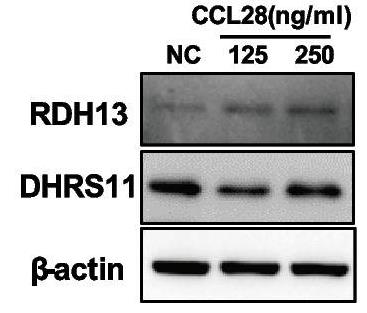
Fig1. Expression of RDH13 and DHRS11 detected by western blot with or without exogenous supplement of CCL28.
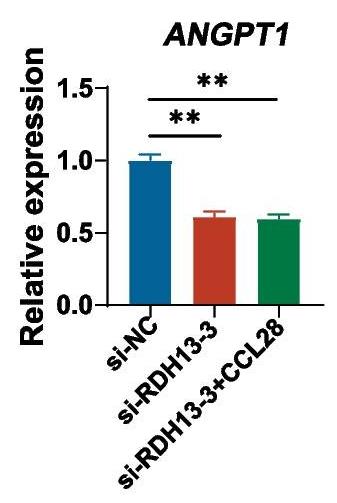
Fig2. Relative expression of ANGPT1 after knockdown of RDH13 with or without stimulation of CCL28.
Case 2: Ren L, et al. Oncotarget. 2016
Tumor cells create a microenvironment to adapt and evade immune detection, especially during growth and spread. This study reveals that in low-oxygen conditions, hepatocellular carcinoma (HCC) cells increase CCL28 to attract regulatory T cells (Tregs), supporting tumor growth and blood vessel formation. Blocking CCL28 reduces Treg recruitment, while boosting it enhances tumor expansion. Additionally, inhibiting HIF1α stops CCL28's rise under hypoxia. This connection between Tregs and low oxygen in HCC might offer a new treatment target.
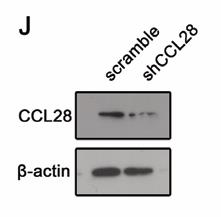
Fig1. CCL28 knockdown efficiency in SK-Hep-1 cells was analyzed by western blot assay.
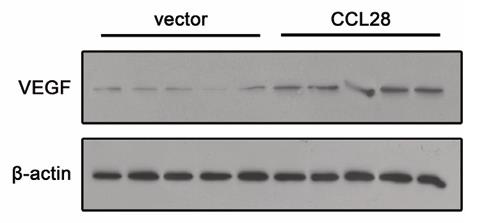
Fig2. Western blot analysis of VEGF expression in Hepa1-6 and Hepa1-6-CCL28 tumors.
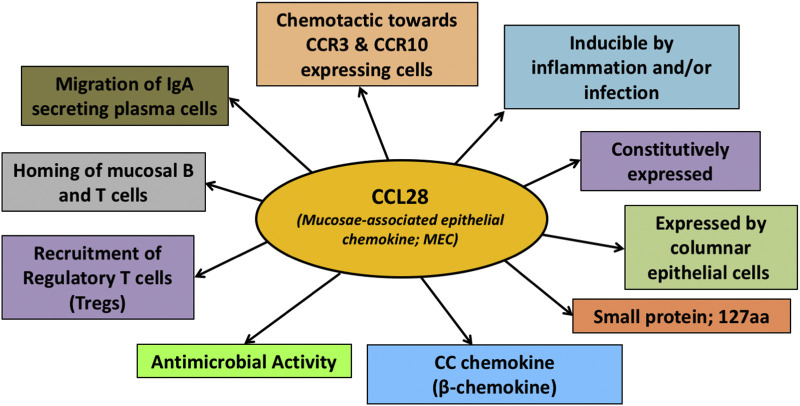
Fig1. Top 10 properties of CCL28. (Teena Mohan, 2017)
Not For Human Consumption!
Inquiry
- Reviews
- Q&As
Ask a Question for All CCL28 Products
Required fields are marked with *
My Review for All CCL28 Products
Required fields are marked with *
Inquiry Basket


